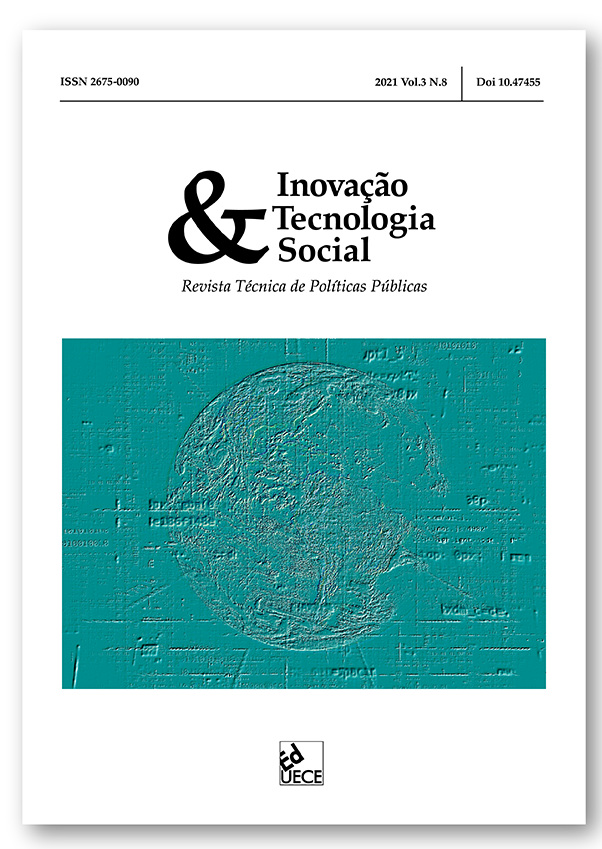Educação Musical e suas contribuições para a Formação da cidadania:
estudo de caso do Centro de Educação Profissional em Música Walkíria Lima
DOI:
https://doi.org/10.47455/2675-0090.2021.3.8.10214Keywords:
education, music, citizenshipAbstract
Music, its construction through culture, and the relationships that educational policies influence in the learning and formation of citizenship are closely intertwined. Education can be a participatory process in which the human being acquires knowledge through interaction with others and with the environment. The act of learning involves both personal and social processes. And musicality, culture and educational policies make use of these processes as well as answer many questions that are pursued in the research.This study investigates the contributions of Music Education through methodologies, teaching practices and organizational climate. The objective of this study was to investigate the contributions of Public Music Education to the formation of citizenship based on a case study with the actors involved in the Center of Vocational Education in Music Walkíria Lima. It outlined as specific objectives: To understand the public policies of professional training in music in Amapá; to understand the teaching-learning methodology of CEPM Walkiria Lima; to verify the involvement of the Professional Education Center in Music Walkiria Lima in intervention projects and social actions; to analyze the center's contributions and its implications for the valuation of citizenship in the students' learning in the center, from the management perspective, teachers and students themselves.In this perspective, the research presents a methodological approach of a qualitative nature, exploratory and descriptive, in the form of a case study, characterized by the propositions of Gil (2002), Yin (2001), Chizzotti (2006) and, Bogdan and Biklen (1994), using documental research and semi-structured interviews as data collection techniques, followed by documentary analysis and content analysis. The curriculum demonstrated the reproduction of the disciplines historically studied in this institution, confirming the initial hypothesis for the study: that the conservatory habitus is present in the music center and in the methodology applied in the classroom, updating itself in the subfield of the musical formation and that this habitus influenced the student learning process egressed from the Music Center. There have been attempts to break with the conservative tradition, through the attention given to popular music, folk music, and basic education.However, the presence of tradition is very intense in the structure of the curriculum of this musical formation, which ended up reflecting in the profile of the teacher, in the themes of instrumental and vocal practices, bibliographic collection and methodologies applied toteaching of music, producing a structure similar to that of conservatories.
References
ADORNO, Theodor W. A indústria cultural: o esclarecimento como mitificação das massas. In: LIMA, Luiz Costa. Teoria da cultura de massa. Rio de Janeiro: Saga, 1969.
ASSOCIAÇÃO BRASILEIRA DE NORMAS TÉCNICAS. NBR 6023:informação e documentação: referências: elaboração. Rio de Janeiro, 2002.
BARROS, A.J.S.; LEHFELD, N.A.S. Fundamentos de metodologia científica. 3.ed. São Paulo: Pearson Prentice Hall, 2007. 158 p.
BOLEIZ JÚNIOR, F. Música: dos jesuítas até nossos dias. [S.l;s.n], 2008. Disponível em:< www.uol.com.br/aprendiz/n_colunas/coluna_livre.htm>. Acesso em: 23 abr. 2019.
BRASIL. Decreto n.º 981, de 8 de novembro de 1890. Diário Oficial [da] República Federativa do Brasil, Brasília, 8 nov. 1980. Disponível em: <http://www2.camara.leg.br/legin/fed/decret/1824-1899/decreto-981-8-novembro-1890515376-publicacaooriginal-1-pe.html>. Acesso em: 26 fev. 2019.
CONNELL, Robert W. Como teorizar o patriarcado. Revista Educação e Realidade, Porto Alegre, v.16, n.2, p. 85-93, jul./dez. 1990.
CONTIER, Arnaldo. Música no Brasil: história e interdisciplinaridade. Algumas interpretações (1962-1980). In: História em debate. Atas dos XVI Simpósio Nacional de História, ANPUH, Rio de Janeiro: 1991, ANPUH/CNPq, p.151-189.
GILIOLI, R. S. P. “Civilizando” pela música: a pedagogia do canto orfeônico na escola paulista da primeira república (1910-1930). 279 f. Dissertação (Mestrado em Educação) – Universidade de São Paulo, São Paulo. 2003. Disponível em: . Acesso em: 17 mar. 2019.
PENNA, M. Música(s) e seu ensino. Porto Alegre: Sulina, 2012.
RIBAS, L.C.C.; GUIMARÃES, L.B. Cantando o mundo vivo: aprendendo biologia no pop-rock brasileiro. Ciência e Ensino, Campinas, n.12, Dez. 2004.
SANTOS, R. M. S. Música, cultura e educação: os múltiplos espaços de educação musical. Porto Alegre: Sulina, 2012.



